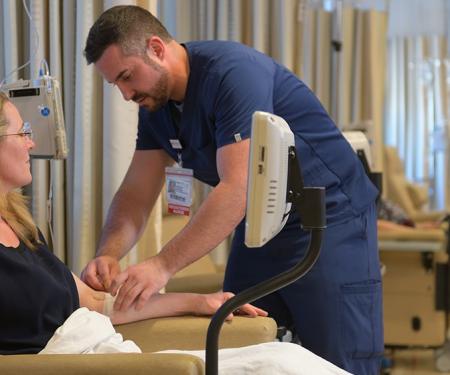Not all treatments have the same side effects. Because of this, patients experience treatments differently than others. Please talk with your doctor or nurse about the possible side effects of your specific treatment. Your care team is here to support you and help you manage any side effects in the best way possible.
Depending on the medicine you’re on, you may experience side effects. Here are some side effects and ways to manage them:
Loss of Appetite, Weight Loss, Changes in How Foods Smell or Taste, or a Metallic Taste in your Mouth
Please let your care team know if you have a change in appetite or weight loss during your treatment. If you are, try these tips:
- Eat small meals often throughout the day.
- Eat foods that are high in protein and calories.
- Use nutritional supplements as directed.
Nausea and/or Vomiting
If you are nauseous or are vomiting, try these tips:
- Take anti-nausea medicine if prescribed by your treatment team (as directed).
- Do not eat foods that are fatty, sweet, spicy or very salty.
- Try to small meals often throughout the day.
Please tell your care team if your nausea or vomiting does not go away with medicine, or if you cannot drink or keep fluids down.
Diarrhea
If you have diarrhea:
- Eat a low-fiber diet high in protein and calories.
- Follow a BRAT diet: bananas, rice and toast.
- Do not eat whole grains, seeds, nuts and foods that are greasy and spicy.
- Stay away from fresh fruits and vegetables.
- Drink lots of fluids, at least 6-8 eight-ounce glasses each day or more if told to you by your treatment team.
- Drink fluids with electrolytes, not just plain water, and stay away from fluids with caffeine.
- Limit or cut out milk and other dairy products.
- Take medicine for diarrhea as directed by your treatment team.
Please let your care team know if you have more than 4 loose stools over a 24-hour period.
Constipation
If you have constipation:
- Eat more high-fiber foods.
- Drink at least 6-8 eight-ounce glasses of fluid each day.
- Increase physical activity, if you can.
- Avoid straining.
- Take stool softeners or laxatives as directed by your treatment team.
Please tell your care team if you do not have a bowel movement within a 24-hour period.
Mouth and Throat Changes
Please let your care team know if you have any changes in your mouth and throat because of your treatment. These include:
- Sores or ulcers
- Dryness
Try these tips:
- Clean your mouth 3-4 times a day using a soft toothbrush and mild toothpaste.
- Keep your lips moist by using lip balm, petroleum jelly or other products.
- Do not eat irritating foods (including foods that are acidic, spicy, salty or coarse).
- Eat soft and moist foods that are easy to swallow.
- Rinse your mouth with a mixture of warm salt water and baking soda. (Ask your nurse for instructions on the recipe.)
- Do not use alcohol-based oral hygiene products.
- Stay away from tobacco, alcohol and sugary drinks.
Hair Loss
Not every patient will experience hair loss. Some patients don't lose any hair; some lose all their hair. That's because infusion and chemotherapy medicine attack growing cancer cells. Unfortunately, this means the medicines may also attack other growing cells in your body, like the ones in your hair. Chemotherapy may cause hair loss all over your body — not just on your scalp. Talk to your doctor or nurse about the medicine you're on. They can tell you if you can expect to lose your hair.
If you do, Fox Chase has support services to help. Learn more information here.
More Side Effects:
- Low White Blood Cell Count and Infection
- Bleeding and/or Anemia
- Cancer-Related Fatigue
- Nail Inflammation, Infection, and/or Skin Reactions
- Muscle aches
Preserving Fertility
Certain infusion treatments can affect a patient's ability to be fertile and have children. This applies to both women and men. Whether your fertility is at risk depends on your individual treatment plan—including the treatment type and dosage, and how long it lasts. Your age, fertility before diagnosis, and other health issues can also come into play.
It's important to tell your doctor if you plan on having children before you start infusion treatments because there may be ways to preserve your fertility, so you have the option of having children after your cancer treatment is over. Find out more information on preserving fertility here.
Emotional Side Effects
In addition to physical side effects, you may have emotional side effects as a result of the life changes that come with cancer treatment. It’s perfectly normal. It’s why we offer free social work services and it’s why we have a full team of social workers who specialize in helping cancer patients and their families here to support you.
Easing Side Effects
It’s very important to tell us how you’re feeling during and after treatment. Sometimes, patients don’t speak up when they’re having side effects because they think their treatment will be stopped, or they assume nothing can be done to help. But, there may be ways to lessen these side effects and make you more comfortable. So please, let us know as soon as possible.
When to Call Fox Chase
Get the attention of a nearby nurse if you’re on campus, or call us from home right away, if you’re experiencing:
- A temperature reading of 100.5 or higher
- Flu-like symptoms like a fever, chills, cough, or a sore throat
- Shortness of breath
- Pain when you urinate
- Blood in your urine or stool
- Unexplained bruising
It's very important that you talk to your team about your side effects. You must call your team as soon as the side effects start. Do not wait for the symptoms to get worse. In many cases, it’s possible to reverse some symptoms if they’re reported early.
When to Call 9-1-1
If you have trouble breathing or shortness of breath, or chest pain, call 9-1-1 immediately.
When to go to the Emergency Room
If you're unable to eat or drink, or have other uncontrolled, or unexpected side effects, go to the Emergency Room. If you have any of these symptoms during your infusion appointment, get the attention of a nurse immediately. Temple University Hospital – Jeanes Campus functions as the Emergency Room for Fox Chase Cancer Center. Please go to Jeanes Campus or to your nearest hospital with an Emergency Room.
Contacting Fox Chase
During weekday daytime hours (Monday–Friday, 8:30am–5pm), call 215-728-4300. You may talk to someone live, or your call will go to voicemail. Please leave a message with your name, medical record number, date of birth and the reason for your call. A nurse will call you back on the same day. Be sure to tell us the best phone number to reach you.
If you have a medical emergency on an evening or weekend, call Fox Chase Cancer Center’s on-call system at 215-728-6900.

